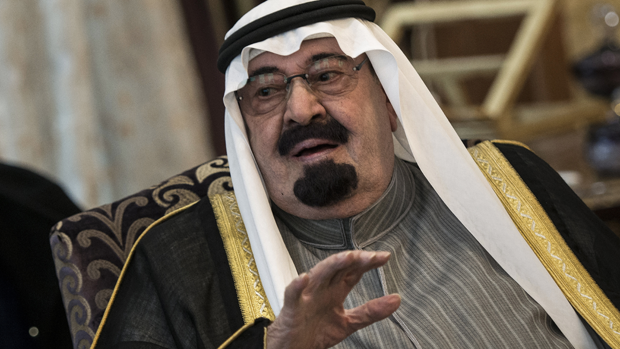King Abdullah, Saudi Arabia's 'cautious reformer', dies at 90
Prince Charles and US Vice President Joe Biden expected to visit Saudi Arabia to pay their respects

A free daily email with the biggest news stories of the day – and the best features from TheWeek.com
You are now subscribed
Your newsletter sign-up was successful
King Abdullah of Saudi Arabia, seen as a moderate reformer in one of the world's most conservative countries, died today at the age of 90.
The exact cause of death has not been confirmed, but Saudi press say he was admitted to hospital with pneumonia at the end of December.
Abdullah officially ascended to the throne in August 2005, putting him in control of a fifth of the world's known petroleum reserves and custodian of Islam's holiest sites, Mecca and Medina.
The Week
Escape your echo chamber. Get the facts behind the news, plus analysis from multiple perspectives.

Sign up for The Week's Free Newsletters
From our morning news briefing to a weekly Good News Newsletter, get the best of The Week delivered directly to your inbox.
From our morning news briefing to a weekly Good News Newsletter, get the best of The Week delivered directly to your inbox.
However, he had effectively been in charge of the kingdom since his half-brother, King Fahd, had a stroke in 1995.
He will be succeeded by another half-brother, Crown Prince Salman, aged 79.
Prince Charles and US Vice President Joe Biden are expected to travel to Saudi Arabia to pay their condolences.
In a statement, President Barack Obama spoke of a "genuine and warm friendship" with Abdullah. "As a leader, he was always candid and had the courage of his convictions," he said.
A free daily email with the biggest news stories of the day – and the best features from TheWeek.com
David Cameron, who visited Saudi Arabia in 2012, said he was "deeply saddened" to hear of Abdullah's death.
"He will be remembered for his long years of service to the kingdom, for his commitment to peace and for strengthening understanding between faiths," said the Prime Minister.
Despite Saudi Arabia facing international criticism for its human right record, Abdullah was seen by many in his home country as a force for moderate change.
He pushed through "cautious reforms", such as giving women a greater public role, despite opposition from religious conservatives, says The Guardian.
However, the newspaper points out that Saudi women are still not allowed to drive, that political parties are still banned and that public beheadings still play a standard part of the judicial system.
The king was married at least 13 times, although kept no more than four wives at once, and leaves behind around 30 sons and daughters.
-
 The plan to wall off the ‘Doomsday’ glacier
The plan to wall off the ‘Doomsday’ glacierUnder the Radar Massive barrier could ‘slow the rate of ice loss’ from Thwaites Glacier, whose total collapse would have devastating consequences
-
 Trump’s fuel blockade puts Cuba in crisis mode
Trump’s fuel blockade puts Cuba in crisis modeIN THE SPOTLIGHT Plummeting tourism, scrambling airlines and rolling blackouts are pushing Cuban society to the brink
-
 ‘The mark’s significance is psychological, if that’
‘The mark’s significance is psychological, if that’Instant Opinion Opinion, comment and editorials of the day
-
 Epstein files topple law CEO, roil UK government
Epstein files topple law CEO, roil UK governmentSpeed Read Peter Mandelson, Britain’s former ambassador to the US, is caught up in the scandal
-
 Iran and US prepare to meet after skirmishes
Iran and US prepare to meet after skirmishesSpeed Read The incident comes amid heightened tensions in the Middle East
-
 Israel retrieves final hostage’s body from Gaza
Israel retrieves final hostage’s body from GazaSpeed Read The 24-year-old police officer was killed during the initial Hamas attack
-
 China’s Xi targets top general in growing purge
China’s Xi targets top general in growing purgeSpeed Read Zhang Youxia is being investigated over ‘grave violations’ of the law
-
 Panama and Canada are negotiating over a crucial copper mine
Panama and Canada are negotiating over a crucial copper mineIn the Spotlight Panama is set to make a final decision on the mine this summer
-
 Why Greenland’s natural resources are nearly impossible to mine
Why Greenland’s natural resources are nearly impossible to mineThe Explainer The country’s natural landscape makes the task extremely difficult
-
 Iran cuts internet as protests escalate
Iran cuts internet as protests escalateSpeed Reada Government buildings across the country have been set on fire
-
 US nabs ‘shadow’ tanker claimed by Russia
US nabs ‘shadow’ tanker claimed by RussiaSpeed Read The ship was one of two vessels seized by the US military